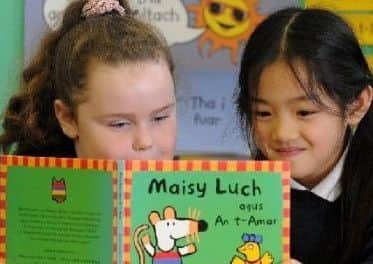Lesley Riddoch: Here’s why the Tories have it so wrong on Gaelic
The linguistic rammy began when Western Isles Council (Comhairle nan Eilean Siar) announced plans to provide only Gaelic medium education (GME) in Primary 1. Parents can opt out if they want children taught in English. Last Thursday in Holyrood, Liz Smith said the move was “deeply troubling” and would put pupils in the Western Isles at a “distinct disadvantage.” Why?
Has Ms Smith not read the copious evidence which shows that bi-lingual children (and multi-lingual people) have better job prospects and better cognitive health in later life? I’m sure she has. Liz Smith seems to take her job seriously and has always appeared well-briefed and relatively open to new ideas.
Advertisement
Hide AdAdvertisement
Hide AdSo, does the Tory MSP just have a problem with Gaelic? If so, she must have missed the fact that Sgoil Ghàidhlig Ghlaschu (the Glasgow Gaelic School) regularly outperforms every other secondary in Glasgow, with half of sixth years achieving five or more Highers. Strange.


Ms Smith has somehow also missed the fact that UK language students (including Gaelic students) lag behind only lawyers, medics and vets in employability. It also seems that even when language graduates are not employed to speak their primary language, the fact they’ve spoken two languages from a young age, makes it far easier to learn more. It’s this versatility, this aptitude for overcoming cultural barriers, this belief in the innate ability of humans to connect and this willingness to inhabit the mindset of other cultures that makes bi-lingual students so very valuable.
But I suspect Liz Smith knows that.
I’m also guessing Ms Smith agrees with Dr Thomas H. Bak, an expert in human cognitive neuroscience (HCN) at Edinburgh University, who observed in a letter to this paper: “There is a wealth of evidence suggesting bilingual children outperform monolingual ones on cognitive tests ... and these effects are not confined to childhood, [but] continue across the lifespan leading to a slower cognitive ageing, delayed onset of dementia and better cognitive recovery after stroke. Remarkably, an improvement in attention has been documented in participants of all ages after a one-week intensive language course … in Gaelic.”
I imagine she was also nodding at the views of Professor Wilson McLeod of Edinburgh University, who told a Sunday newspaper why no Mandarin or German-medium schools exist in Scotland;
“We have Gaelic medium education because parents fought like hell to get it. They organised, they mobilised, they petitioned, and lobbied councillors and just wouldn’t let go. There have been other programmes – there was one in Italian in Glasgow, one in French in Aberdeen. They have never really gone anywhere, there has never been a drive for it.”
Quite. There’s a big drive to learn Gaelic at the moment – prompted in part by the young Gaels behind Scots Gaelic Duolingo. Perhaps Liz Smith hadn’t heard of this sassy new online learning package. I imagine she has now.
Last year, this small group of Gaelic language activists successfully lobbied Duolingo – a free language learning platform with more than 300 million users and 90 languages – to include Scots Gaelic. Now it has 167 thousand signed-up students – that’s twice as many as the official Gaelic-speaking total and includes 2,000 who joined in the wake of Liz Smith’s remarks, and a related newspaper article which attacked bi-lingual road-signs, the efficacy of Bòrd na Gàidhlig and the “sacred cow” status of the Gaelic language.
Add in the patient, educational work of the Feisean movement (teaching traditional music in the Highlands and Islands – and now across Scotland) through the medium of Gaelic since the 1980s.
Advertisement
Hide AdAdvertisement
Hide AdAdd in the inspirational influence of Gaelic-speaking musicians from Julie Fowlis and Karen Mathieson to Peat n Diesel and the director of Celtic Connections, Donald Shaw.
Even folk who don’t speak Gaelic now know for sure they’re missing something. That wasn’t true even five years ago.
Perhaps that’s why Liz Smith made a welcome about-turn this weekend when she tweeted an apology “to those members of the Gaelic community who have been offended. My concerns did not relate to the quality of GME teaching & learning, both of which have such a strong record”.
Of course, that only raised more questions. If the standard of Gaelic Medium teaching isn’t the problem then what is? Many think it’s a straightforward belief that Gaelic’s a “loser language”. This kind of cultural cringe is certainly well-documented but also outdated and faintly embarrassing.
As Argyll MSP and Brexit Minister Mike Russell tweeted last week; “It’s very sad to see someone as intelligent as Liz Smith parroting such nonsense.”
So, does the MSP for Mid Scotland and Fife really share the tired, old, knuckle-dragging aversion to Scotland’s precious, traditional cultures?
I’ll stick my neck out and say I don’t think so. More likely she has been sucked into the dark side of Toryism by the need to fit in with new political masters swept to power south of the Border on a xenophobic, anti-foreigner platform of pro-Brexit isolationism.
Last February, a BBC report showed that the places most likely to have no French or German teaching in school were the biggest Leave areas in England. Maybe it’s a coincidence, but maybe it reflects a worrying pushback against the sound of languages other than English being spoken in Britain.
Does that pushback now include the indigenous languages of Scotland? If so, it’s a massively dangerous development.